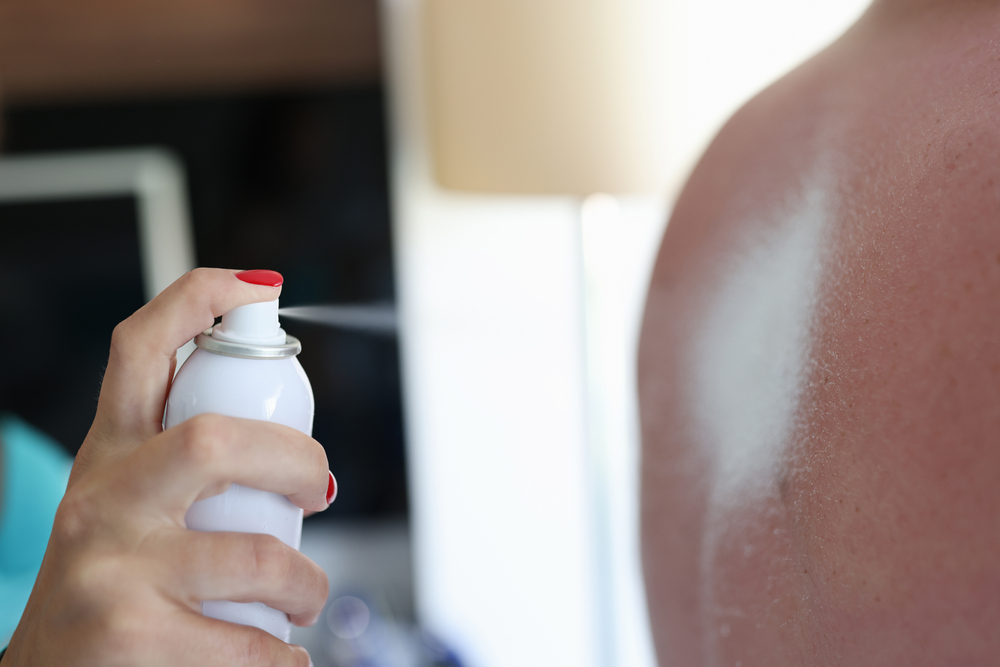Did You Develop Cancer from Benzene in Sunscreen?
Exposure to the carcinogen benzene in popular sunscreen and after-sun products may increase the risk of cancer. Consumers who developed cancer from benzene exposure may be eligible to seek compensation through a sunscreen cancer lawsuit.

Start My Sunscreen Cancer Lawsuit Claim Now
sunscreen cancer Lawsuit
Exposure to the carcinogen benzene in popular sunscreen and after-sun products may increase the risk of cancer. Consumers who developed cancer from benzene exposure may be eligible to seek compensation through a sunscreen cancer lawsuit.
Sunscreen is a product that many of us rely on to protect our skin from the harmful effects of the sun’s ultraviolet (UV) rays. However, recent revelations have brought to light a concerning issue – the presence of benzene, a known carcinogen, in certain sunscreen products, including those used on children and teens. This has led to a wave of personal injury lawsuits against sunscreen manufacturers over claims that their products – including popular brands like Neutrogena, Sun Bum, Coppertone, and Aveeno – cause cancer. If you or a loved one have been diagnosed with cancer or experienced other injuries after using sunscreen, you may be entitled to seek compensation through a sunscreen benzene exposure lawsuit. Call us today or fill out the form to explore your legal options.
What is the Ingredient in Sunscreen that Causes Cancer?
Benzene is the ingredient in question that has sparked concern and legal action against sunscreen manufacturers. Benzene is a colorless or light yellow liquid that is highly flammable and has a sweet smell. It is commonly used in the production of plastics, rubber, and gasoline. While benzene can occur naturally in the environment through forest fires and volcanic eruptions, it is primarily found in manufactured products.
According to David Light, founder and CEO of Valisure, the independent pharmacy that first discovered the presence of benzene in sunscreen and after-sun products, it was likely an error in how the products were made, not what the products were made from. In other words, a “contaminant from the manufacturing process.” Some affected sunscreen manufacturers and brands include:
- Neutrogena
- Banana Boat
- Coppertone
- Aveeno
- Sun Bum
- CVS Health
- Raw Elements
- TopCare
Alleged Side Effects Leading to a Sunscreen Recall Lawsuit
The discovery of benzene in sunscreen products has raised serious health concerns. Prolonged exposure to benzene has been linked to various health conditions, including anemia, decreased ovary size in women, and an increased risk of developing cancer. Benzene is classified as a human carcinogen, meaning it has been proven to cause cancer in humans. Exposure to benzene can damage the body’s cells and corrupt their function, leading to the development of cancerous cells. Studies have shown a clear link between benzene exposure and various types of cancer, including leukemia, lymphoma, and multiple myeloma.
Link Between Benzene Exposure and Cancer
Benzene has been linked to an increased risk of cancer. Studies have shown that prolonged exposure to benzene can lead to the development of several types of cancer, including leukemia and other blood-related cancers. According to research published in the International Journal of Environmental Research and Public Health, long-term occupational exposure to benzene has been associated with an elevated risk of developing leukemia. A systematic review and meta-analysis of observational studies published in the journal Translational Cancer Research found evidence of a higher incidence of non-Hodgkin’s lymphoma among individuals with high benzene exposure. Additionally, the FDA classifies benzene as a Class 1 solvent, meaning its use in pharmaceutical products should be avoided. As a whole, these findings underscore the serious health implications of benzene exposure and emphasize the importance of identifying which consumer products contain benzene.
Pursuing Lawsuits for Sunscreen-Related Benzene Exposure
If you or a loved one have been diagnosed with cancer or experienced other injuries after using sunscreen products that contain benzene, you may have grounds for a lawsuit against the manufacturers. These lawsuits aim to hold the companies accountable for their failure to ensure the safety of their products and to seek compensation for the damages caused by benzene exposure.
Lawsuits Against Sunscreen Manufacturers Over Cancer
Sunscreen manufacturers like Johnson & Johnson (Neutrogena and Aveeno) have faced lawsuits related to benzene exposure in their products. The lawsuits allege that the companies failed to adequately test their products for the presence of benzene and failed to warn consumers about the potential health risks associated with their use. Affected individuals are seeking compensation for medical expenses, pain and suffering, and other damages caused by their exposure to benzene.
October 2021: The Judicial Panel on Multidistrict Litigation (JPML) consolidates all federal sunscreen cancer lawsuits against Johnson & Johnson over Neutrogena- and Aveeno-branded sunscreen products containing excessive amounts of benzene.
March 2022: Judge Singhal, the U.S. District Judge presiding over the Johnson & Johnson sunscreen lawsuits, grants preliminary approval for a settlement agreement that would resolve at least eight class action lawsuits brought against Johnson & Johnson over the presence of benzene in Neutrogena and Aveena sunscreen products.
February 2023: Judge Singhal grants final approval for a sunscreen class action settlement, in which Johnson & Johnson agrees to issue full refunds for recalled spray sunscreen products and nearly $2 million in vouchers for consumers who purchased sunscreen products containing benzene that were not affected by the massive sunscreen recall.
December 2023: A California district court allows a personal injury lawsuit to proceed against Johnson & Johnson over claims that exposure to benzene in the company’s spray sunscreen caused a teenage girl to develop leukemia.
January 2024: Johnson & Johnson faces another sunscreen cancer lawsuit, this one brought by the father of a 14-year-old boy who died from leukemia allegedly caused by prolonged exposure to benzene in the company’s sunscreen products.
Sunscreens Recalled for Benzene Contamination
In May 2021, an independent laboratory detected benzene in 78 batches of sunscreen and after-sun products. This led to recalls of several aerosol sunscreens, deodorants, conditioners, shampoos, and athlete’s foot treatments. Major consumer products companies, including Johnson & Johnson, recalled their affected products after the discovery of benzene contamination.
In the years since, major manufacturers like Unilever, Procter & Gamble, and Johnson & Johnson have announced recalls of aerosol sunscreens due to benzene contamination. The recalls have drawn attention to the presence of benzene in aerosol beauty products, leading to increased consumer awareness and concern.
In July 2021, the FDA issued a recall for Neutrogena and Aveeno aerosol sunscreen products after internal testing identified benzene in some samples of the products. The FDA has been urged to investigate affected sunscreen and after-sun products and their manufacturing processes for evidence of benzene contamination.
Benzene Exposure Side Effect Research
Scientific studies have consistently demonstrated the harmful effects of benzene exposure on human health. These studies provide compelling evidence for the detrimental impact of benzene on the body and support the claims made by individuals pursuing sunscreen benzene exposure lawsuits.
EPA: Benzene classified as known human carcinogen
The EPA publishes a benzene hazard summary, indicating that “Increased incidence of leukemia (cancer of the tissues that form white blood cells) have been observed in humans occupationally exposed to benzene.” Based on this information, the EPA classifies benzene as a known human carcinogen.
April 1992Occupational benzene exposure linked to lymphoma sub-types
A meta-analysis of cohort studies finds a link between occupational benzene exposure and a risk of lymphoma subtypes, including multiple myeloma, acute lymphocytic leukemia, and chronic lymphocytic leukemia.
September 2010Benzene associated with development of blood cancers
A study published in the journal Annual Review of Public Health discusses the health effects of benzene, including its association with the development of blood cancers, providing insights into the risks associated with benzene exposure.
March 2015"Sufficient evidence in humans for carcinogenicity of benzene": Study
According to a publication from the International Agency for Research on Cancer, “There is sufficient evidence in humans for the carcinogenicity of benzene. Benzene causes acute myeloid leukemia in adults.” The researchers also note that “positive associations have been observed for non-Hodgkin lymphoma, chronic lymphoid leukemia, multiple myeloma, chronic myeloid leukemia, acute myeloid leukemia in children, and cancer of the lung.”
2018Research: Link between benzene exposure and hematologic cancers
A study reveals a link between residential ambient benzene exposure in the United States and the subsequent risk of hematologic cancers, particularly myelodysplastic syndromes, T-cell lymphoma, and follicular lymphoma.
November 2019Benzene found in 384 sunscreen and after-sun product samples
An independent review of 661 sunscreen and after-sun care products for benzene contamination finds benzene at various levels in a total of 384 samples.
March 2022High exposure to benzene linked to higher risk of NHL
The journal Translational Cancer Research publishes a systematic review and meta-analysis of observational studies indicating that people with high exposure to benzene have a higher risk of non-Hodgkin’s lymphoma.
June 2022Chronic occupational benzene exposure leads to higher rates of leukemia: Study
Research published in the International Journal of Environmental Research and Public Health finds that workers with chronic occupational exposure to benzene have higher rates of leukemia.
March 2023Why We Think Manufacturers Should be Held Liable
Manufacturers have a responsibility to ensure the safety of their products before they reach consumers. When it comes to sunscreen, a product that is intended to protect against skin damage and reduce the risk of cancer, the presence of a known carcinogen like benzene is unacceptable. Manufacturers should conduct thorough testing to identify and eliminate any potential contaminants, and they should provide clear warnings about the risks associated with their products. Failing to meet these standards puts consumers at risk and should result in legal consequences for the manufacturers and fair and timely compensation for affected individuals.
Johnson & Johnson Consumer Inc. Issues Voluntary Recall of Specific NEUTROGENA® and AVEENO® Aerosol Sunscreen Products Due to the Presence of Benzene, FDA
Benzene Hazard Summary, EPA
Occupational benzene exposure and the risk of lymphoma subtypes: a meta-analysis of cohort studies incorporating three study quality dimensions, Environmental Health Perspective
Advances in Understanding Benzene Health Effects and Susceptibility, Annual Review of Public Health
Benzene, International Agency for Research on Cancer
Residential ambient benzene exposure in the United States and subsequent risk of hematologic malignancies, International Journal of Cancer
Independent Sun Care Product Screening for Benzene Contamination, Environmental Health Perspective
Benzene exposure increases the risk of non-Hodgkin’s lymphoma: a systematic review and meta-analysis of observational studies, Translational Cancer Research
Leukemia Mortality among Benzene-Exposed Workers in Brazil, International Journal of Environmental Research and Public Health
Product Lawsuits

Start My Sunscreen Benzene Exposure Lawsuit Claim Now

What should you do? If you have developed cancer or other injuries allegedly caused by benzene in sunscreen, you should contact a lawyer as soon as possible to discuss filing a sunscreen benzene exposure lawsuit.
Start Your Claim Now!
The presence of benzene in sunscreen products has raised serious concerns about the safety of these widely used products. If you or a loved one have been diagnosed with cancer or experienced other injuries after using sunscreen containing benzene, you may be eligible to pursue legal action against the manufacturers. By seeking legal representation, you can hold these companies accountable for their negligence and seek compensation for the damages you have suffered. Don’t wait to protect your rights – call our consumer advocates now to understand your options and pursue justice.
- Fight to Get The Compensation You Deserve
- Experienced Sunscreen Benzene Exposure Attorneys Within Reach

